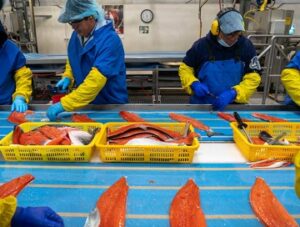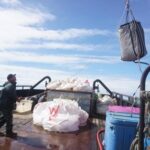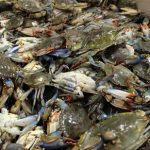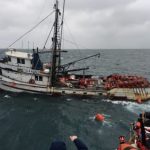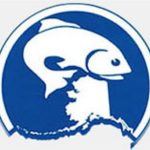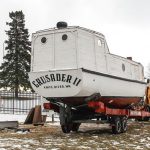Tag Archives: Trident Seafoods
How a Risky State Investment in Seafood Cost Alaskans Millions and left a Fishing Town in Crisis
 Last summer, an unsettling quiet cloaked the isolated Southwest Alaska community of King Cove as the town’s economic engine — a sprawling seafood processing plant — sat shuttered. Bunkhouses, once filled with hundreds of workers during the peak salmon harvest, were vacant. Four diesel generators that had rumbled day and night were stilled. The plant docks, once lined with boats and circled by fish-scavenging gulls, were empty. The closure resulted from the financial implosion of the plant’s owner, Peter Pan Seafood. Some local fishing boat captains directed their ire at company leaders who accepted their seafood, then failed to pay them. They dwelled far less on a surprising, largely silent, powerhouse investor in the plant: the state of Alaska. Photos, more, >>CLICK TO READ<< 12:41
Last summer, an unsettling quiet cloaked the isolated Southwest Alaska community of King Cove as the town’s economic engine — a sprawling seafood processing plant — sat shuttered. Bunkhouses, once filled with hundreds of workers during the peak salmon harvest, were vacant. Four diesel generators that had rumbled day and night were stilled. The plant docks, once lined with boats and circled by fish-scavenging gulls, were empty. The closure resulted from the financial implosion of the plant’s owner, Peter Pan Seafood. Some local fishing boat captains directed their ire at company leaders who accepted their seafood, then failed to pay them. They dwelled far less on a surprising, largely silent, powerhouse investor in the plant: the state of Alaska. Photos, more, >>CLICK TO READ<< 12:41
Pacific Seafood Completes Acquisition of Trident’s Kodiak Operations
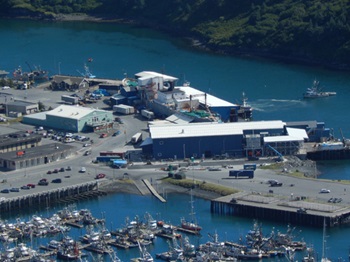 Pacific Seafood and Trident Seafoods today jointly announced the completion of Pacific’s acquisition of Trident’s Kodiak, Alaska, processing operations. The acquisition includes three well-established processing plants—Star of Kodiak, Alkod, and Kodiak Near Island—as well as the Plaza bunkhouse apartments for team member housing. Trident’s Kodiak team members will be retained by Pacific Seafood, ensuring continuity and stability for the team and the local community. “Kodiak is home to some of the most abundant and sustainable fisheries in the world, and we are honored to partner with our new, very talented team members, the fleet and the community to unlock new opportunities for this region,” more, >>CLICK TO READ<< 10:27
Pacific Seafood and Trident Seafoods today jointly announced the completion of Pacific’s acquisition of Trident’s Kodiak, Alaska, processing operations. The acquisition includes three well-established processing plants—Star of Kodiak, Alkod, and Kodiak Near Island—as well as the Plaza bunkhouse apartments for team member housing. Trident’s Kodiak team members will be retained by Pacific Seafood, ensuring continuity and stability for the team and the local community. “Kodiak is home to some of the most abundant and sustainable fisheries in the world, and we are honored to partner with our new, very talented team members, the fleet and the community to unlock new opportunities for this region,” more, >>CLICK TO READ<< 10:27
Trident to sell Kodiak plant to Pacific Seafood
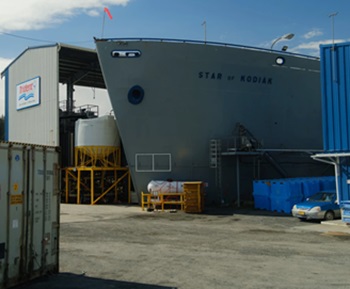 Kodiak’s largest seafood processing plant has a new owner. Trident Seafoods announced on Oct. 14 that it reached a deal with Pacific Seafood for the downtown facility. The Star of Kodiak plant in its namesake town is the last plant to sell after Trident, which is based in Seattle, announced a major restructuring plan back in December 2023, which included selling four plants in Alaska – a third of the company’s facilities in the state. Trident noted the tough state of the seafood industry for its decision – a market collapse detailed by a recent “economic snapshot” from the National Oceanic and Atmospheric Administration, which found that Alaska’s seafood industry was worth $1.8 billion less in 2023 than it was in 2022. Links, more, >>CLICK TO READ<< 09:39
Kodiak’s largest seafood processing plant has a new owner. Trident Seafoods announced on Oct. 14 that it reached a deal with Pacific Seafood for the downtown facility. The Star of Kodiak plant in its namesake town is the last plant to sell after Trident, which is based in Seattle, announced a major restructuring plan back in December 2023, which included selling four plants in Alaska – a third of the company’s facilities in the state. Trident noted the tough state of the seafood industry for its decision – a market collapse detailed by a recent “economic snapshot” from the National Oceanic and Atmospheric Administration, which found that Alaska’s seafood industry was worth $1.8 billion less in 2023 than it was in 2022. Links, more, >>CLICK TO READ<< 09:39
Anchoring the Family: The Life, Labor and Love of an Alaskan Fishing Mom
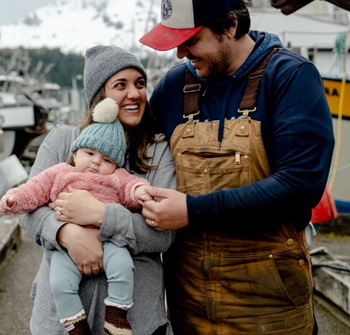 It’s called a labor of love for a reason. A life in fishing – especially in Alaska – can be equally rough and rewarding, spending days at sea where the wonders of the world take shape in glacial ridges and splashes of fish slipping over each other on deck. What you don’t always see is the effort, will, patience and passion of the people caring for those on the water from behind the shoreline. On the rugged coast of southern Alaska, where icy waters provide hope for a rich season, Kinsey Brown and her husband, Zeke, have woven their lives into the fabric of their small fishing community. It’s been said countless times by dedicated seafood harvesters across the globe that fishing is more than a livelihood. It’s a calling, community and a legacy that nearly all who fish hope to pass down to the newest generations of their fishing families. Video, photos, more, >>CLICK TO READ<< 10:30
It’s called a labor of love for a reason. A life in fishing – especially in Alaska – can be equally rough and rewarding, spending days at sea where the wonders of the world take shape in glacial ridges and splashes of fish slipping over each other on deck. What you don’t always see is the effort, will, patience and passion of the people caring for those on the water from behind the shoreline. On the rugged coast of southern Alaska, where icy waters provide hope for a rich season, Kinsey Brown and her husband, Zeke, have woven their lives into the fabric of their small fishing community. It’s been said countless times by dedicated seafood harvesters across the globe that fishing is more than a livelihood. It’s a calling, community and a legacy that nearly all who fish hope to pass down to the newest generations of their fishing families. Video, photos, more, >>CLICK TO READ<< 10:30
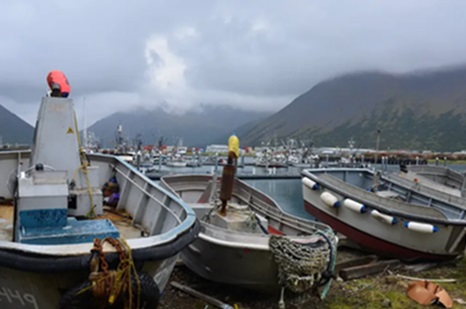
Alaska fishermen and processing plants are in limbo as a state-backed seafood company teeters
The fishing fleet in the Southwest Alaska town of King Cove would have been harvesting Pacific cod this winter. But they couldn’t: Skippers had nowhere to sell their catch. The enormous plant that usually buys and processes their fish never opened for the winter season. The company that runs the plant, Peter Pan Seafoods, is facing six-figure legal claims from fishermen who say they haven’t been paid for catches they delivered months ago. King Cove’s city administrator says the company is behind on its utility payments. And now, residents fear the plant may stay closed through the summer salmon season, which would leave the village with just half of the revenue that normally funds its yearly budget. “We should be fishing right now,” said Ken Mack, a longtime King Cove fisherman. more, >>click to read<< 09:36
Fishermen and community leaders react to Trident announcement to sell a third of its Alaska plants
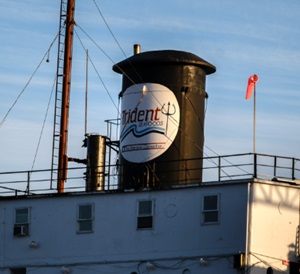 Gerry Cobban Knagin is a commercial fisherman. She and her family have fished around Kodiak and sold their harvest to Trident Seafoods, one of the largest seafood processors in the country, on and off for decades. But on Dec. 12, the company announced it’s selling off about a third of its Alaska processing plants, including their year-round facility in Kodiak. She said the announcement was a huge shock for almost everyone on the island. “Speaking with [Trident] management, there wasn’t any heads up for anyone,” Knagin said. “And they decided, according to management, that they wanted full transparency so that the fleet would know.” Photos, more, >>click to read<< 20:44
Gerry Cobban Knagin is a commercial fisherman. She and her family have fished around Kodiak and sold their harvest to Trident Seafoods, one of the largest seafood processors in the country, on and off for decades. But on Dec. 12, the company announced it’s selling off about a third of its Alaska processing plants, including their year-round facility in Kodiak. She said the announcement was a huge shock for almost everyone on the island. “Speaking with [Trident] management, there wasn’t any heads up for anyone,” Knagin said. “And they decided, according to management, that they wanted full transparency so that the fleet would know.” Photos, more, >>click to read<< 20:44
Trident Seafoods announces plan to streamline, modernize operations
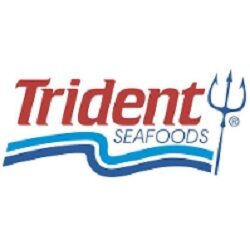 Trident Seafoods, a corporate giant among North American seafood processors, is looking for potential buyers for four of its shoreside plants in Alaska as part of a restructuring plan announced on Tuesday from its headquarters in Seattle. Such bold action is necessary to deliver fair value to fleet, communities and all stakeholders into the future, said Joe Bundrant, CEO of the company built by his father, Chuck Bundrant, starting more than 50 years ago with a single fishing vessel. Bundrant said he remains confident overall of the Alaska seafood industry and Trident’s role in it. He acknowledged these significant changes and said the company is focused on treating its impacted employees and communities with the respect and compassion they deserve. more, >>click to read<< 13:43
Trident Seafoods, a corporate giant among North American seafood processors, is looking for potential buyers for four of its shoreside plants in Alaska as part of a restructuring plan announced on Tuesday from its headquarters in Seattle. Such bold action is necessary to deliver fair value to fleet, communities and all stakeholders into the future, said Joe Bundrant, CEO of the company built by his father, Chuck Bundrant, starting more than 50 years ago with a single fishing vessel. Bundrant said he remains confident overall of the Alaska seafood industry and Trident’s role in it. He acknowledged these significant changes and said the company is focused on treating its impacted employees and communities with the respect and compassion they deserve. more, >>click to read<< 13:43
Bristol Bay fleets call for greater price transparency
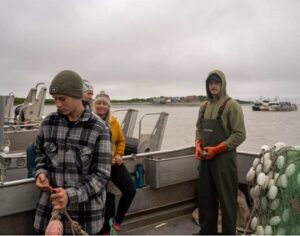 There’s a multi-decade precedent for Bristol Bay salmon processors to wait until the season is underway to announce what they’re willing to pay. Peter Pan shook up the industry in 2021 and 2022 by announcing a base price at the start of the season, but this year waited until mid-July, along with other processors in the region. Captain Konrad Schaad, of the Fishing Vessel Skua, says this model hurts fishers. “The producer gets paid what’s left over. We produce the fish and then it gets processed and sold and everything and everybody gets their cut, and then the morsels that are leftover, they give to us. There should be a fixed cost for what we produce here,” he said. In Bristol Bay, commercial fishing crews fish on what’s called an ‘open ticket. >click to read< 12:53
There’s a multi-decade precedent for Bristol Bay salmon processors to wait until the season is underway to announce what they’re willing to pay. Peter Pan shook up the industry in 2021 and 2022 by announcing a base price at the start of the season, but this year waited until mid-July, along with other processors in the region. Captain Konrad Schaad, of the Fishing Vessel Skua, says this model hurts fishers. “The producer gets paid what’s left over. We produce the fish and then it gets processed and sold and everything and everybody gets their cut, and then the morsels that are leftover, they give to us. There should be a fixed cost for what we produce here,” he said. In Bristol Bay, commercial fishing crews fish on what’s called an ‘open ticket. >click to read< 12:53
Trident’s new processing plant in Unalaska will be the largest in North America
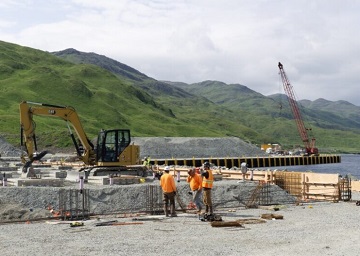 Trident Seafoods has begun building the first bunkhouses at its to-be processing plant in Unalaska’s Captains Bay, progressing on a timeline the seafood titan says would make it operational by 2027. The Aleutian Islands and Bering Sea region is home to some of the world’s most productive fishing grounds. It’s where most Alaska pollock comes from, the whitefish found in fish sticks and McDonald’s Filet-O-Fish sandwiches worldwide. And a lot of that fish is processed at the giant Trident Seafoods plant in Akutan. But aging infrastructure and decades of wear prompted the seafood company to plan a new facility. >click to read< 10:35
Trident Seafoods has begun building the first bunkhouses at its to-be processing plant in Unalaska’s Captains Bay, progressing on a timeline the seafood titan says would make it operational by 2027. The Aleutian Islands and Bering Sea region is home to some of the world’s most productive fishing grounds. It’s where most Alaska pollock comes from, the whitefish found in fish sticks and McDonald’s Filet-O-Fish sandwiches worldwide. And a lot of that fish is processed at the giant Trident Seafoods plant in Akutan. But aging infrastructure and decades of wear prompted the seafood company to plan a new facility. >click to read< 10:35
Photos: On the water with Bristol Bay’s protesting fishing crews
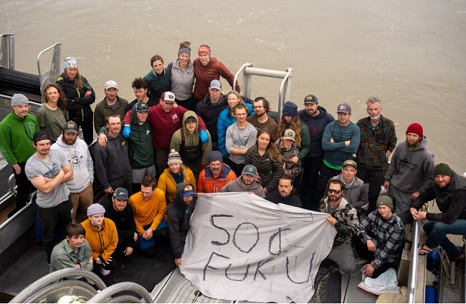 Commercial fishing crews joined together at the mouth of the Naknek River to peacefully protest the low price that processors are offering for this year’s sockeye salmon. They want processors to reconsider the 50 cents per-pound price, as well as more transparency in the fishery. The protest began at 6:00 AM on Thursday, July 20, and lasted through the day. >click to see the photos< 11:33
Commercial fishing crews joined together at the mouth of the Naknek River to peacefully protest the low price that processors are offering for this year’s sockeye salmon. They want processors to reconsider the 50 cents per-pound price, as well as more transparency in the fishery. The protest began at 6:00 AM on Thursday, July 20, and lasted through the day. >click to see the photos< 11:33
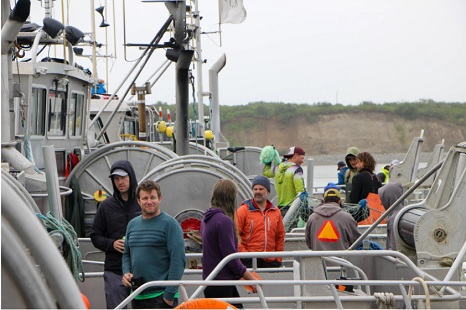
Bristol Bay fishermen protest low base price, lack of transparency
By 9 am, over one hundred boats are anchored in the Naknek River entrance, some after a night of fishing the Naknek-Kvichak. Ivan Basargin of the fishing vessel Top Notch is one of them. He’s here to join the demonstration against this year’s low price. Standing in the wheelhouse of a boat he built, he says this year’s low-price hits hard. “I’m going to pay my workers. I’m going to pay my bills. As far as living expenses, I haven’t decided yet. This 50 cents that I get, when I get home, it’s going to be a wash. I’m not going to have any money in the bank saved,” he said. Organizers of the protest are calling on processors to reconsider and improve the base price this season from 50 cents per pound, less than half of last year’s price. “If they know we can fish for 50 cents, we’re going to get paid 30 cents next year,” he said. “That will happen if we don’t do anything. Like today – this is a peaceful protest. We’re not trying to block people or anything. We’re just trying to show the world that we’re hurting, and we need some help.” Basargin says processors are claiming they are struggling financially too but he hasn’t seen evidence of this struggle. >click to read< 17:15
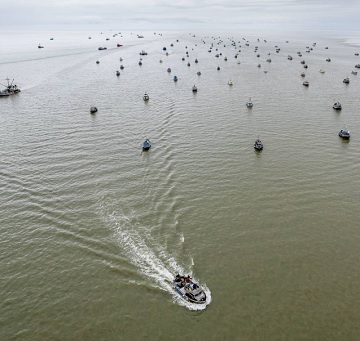
Alaska salmon fishermen fume over low prices, but processors say they’re hurting too
Aboard the F/V Five Star, his boat, Danielson and his deckhand put away as many pounds of fish as they could. They had no breakdowns. But his seafood processor is paying him 70 cents per pound for his salmon, half of last year’s price which means that instead of his usual six-figure haul for a summer of hard work, he might only break even, or go home to his family in Washington with $10,000, if he’s lucky. He added: “We’re up against something that’s out of our control, and that’s the processors killing us here.” In the past few weeks, thousands of fishermen across the state have found themselves in a similar predicament,,, Photos, >click to read< 08:52

Bristol Bay fishermen up in arms against lower salmon prices, will protest
Commercial fishermen in the Bristol Bay region are voicing their displeasure against recent prices of sockeye salmon. According to fisherman Cheyne Blough, the price of sockeye salmon hovered around $1.20-$1.50 per pound, but as of recently, the price dropped to 50 cents. “We all expected less than last year. But we had no clue it was gonna be basically kind of bankruptcy prices,” Blough said. Since then, Blough along with several other commercial fishermen have set up a protest that will happen on Thursday, where fishermen will line up their boats in front of the Naknek River, in protest of the lowered prices. Video, >click to read< 07:50
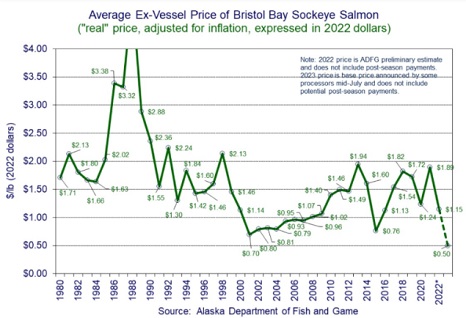
Bristol Bay bust – Bristol Bay salmon prices hit rock bottom
Prices paid commercial fishermen for their catches of wild, Bristol Bay sockeye salmon have just set a modern record low of 50 cents per pound. That’s only three cents per pound less than the average price paid for a Southeast Alaska pink salmon – or humpy as Alaskans usually call the smallest and blandest tasting of the Pacific – in 2018, according to Alaska Department of Fish and Game data. With a correction for inflation, that old humpy would now be worth 8 cents more per pound than a Bristol Bay sockeye. The last time the Bay saw anything like this was more than two decades ago when the sockeye price hit 42 cents per pound. Once inflation adjusted, however, those fish had a value of 70 cents per pound – 20 cents more than what Trident Seafoods and other processors are now offering. >click to read< 07:53
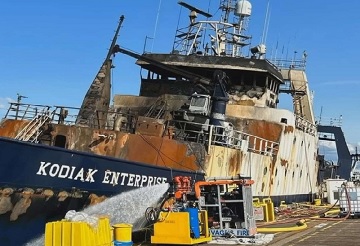
F/V Kodiak Enterprise: Crews removing water, chemicals from Tacoma fishing boat before investigating cause of fire
Crews extinguished the last of the fires Friday but investigators who will look for the cause still aren’t able to set foot on the boat. Officials said a few things need to happen first, like the removal of the gas, oil, and water still on the vessel. “Right now, the biggest priority is dewatering the vessel to right it, ” said U.S. Coast Guard Petty Officer Steve Strohmaier. The 276-foot Kodiak Enterprise still lists to one side. It’s because of the water poured into the boat to put out the flames. Getting that water and other potentially damaging chemicals off the boat is the new priority. >click to read< 07:29
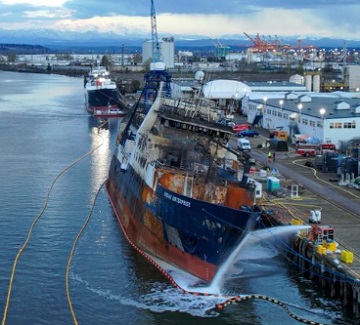
F/V Kodiak Enterprise: Firefighters extinguish hot spots, prepare to scale back response to fishing boat fire in Tacoma
The fire on the 276-foot vessel Kodiak Enterprise started at around 3:30 a.m. Saturday while the boat was moored at Trident Seafoods in the Hylebos Waterway, according to a news release from the U.S. Coast Guard. The fire department is currently working on a demobilization plan to scale back its response to the incident. “Now that it’s safe, we’re actually putting people in those individual rooms [of the vessel] again. Things have cooled down, and we’re actually able to go compartment by compartment and check those off,” said Magliocca. “It seems like there’s no pressure on the tanks that we’ve been worried about, the freon tank and the fuel tank.” Photos, >click to read< 08:05
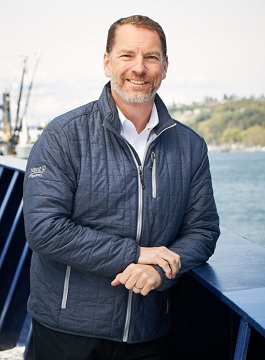
Trident Seafoods marks 50th anniversary
A major seafood processing company that began with a single vessel operating out of Kodiak in 1973 marked its 50th anniversary on Jan. 31, celebrating all those who helped Trident become the largest vertically integrated seafood firm in the nation. “At our core, we are a people business, and what sets us apart is how we care for each other,” said Joe Bundrant, chief executive officer of the company, and son of the late Chuck Bundrant, who would have celebrated his 81st birthday on Jan. 31. Starting back in 1973, Trident set a new precedent for the crabbing and fishing industry by catching, processing and freezing king crab onboard the same ship. >click to read< 09:36
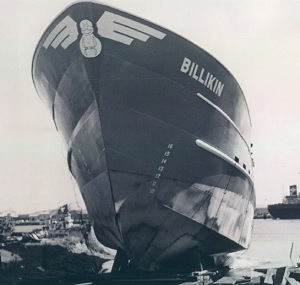 Seattle-based seafood giant Trident reaches half-century mark – In the summer of 1973, Trident Seafoods co-founder Chuck Bundrant went to a Tacoma shipyard to launch the Billikin, a 135-foot steel boat able to operate for more than a month offshore, catching and processing crab with a crew of 16. Back then, Trident was a new startup working out of a couple of trailers in Seattle’s Ballard waterfront. Chuck Bundrant took the Billikin north to the Bering Sea, where he was able to earn an early fortune tapping into red king crab stocks that surged through the ’70s. >click to read< 2/5/2023
Seattle-based seafood giant Trident reaches half-century mark – In the summer of 1973, Trident Seafoods co-founder Chuck Bundrant went to a Tacoma shipyard to launch the Billikin, a 135-foot steel boat able to operate for more than a month offshore, catching and processing crab with a crew of 16. Back then, Trident was a new startup working out of a couple of trailers in Seattle’s Ballard waterfront. Chuck Bundrant took the Billikin north to the Bering Sea, where he was able to earn an early fortune tapping into red king crab stocks that surged through the ’70s. >click to read< 2/5/2023
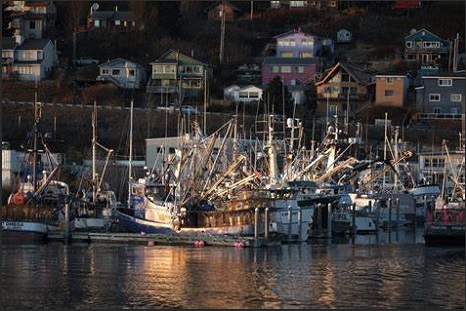
Victory! After a 2 week stand down, Kodiak’s Tanner crab strike is over
Each of Kodiak’s four canneries offered slightly different deals – Alaska Pacific Seafoods agreed to $3.35 per pound plus a retro payment – which can boost the final payout to fishermen after the season. Pacific Seafood also agreed to $3.35 per pound with a possible retro to fishermen. OBI settled with crabbers for $3.25 plus profit sharing, and Trident Seafoods stayed at $3.25 per pound. It wasn’t exactly the deal Kodiak crabbers were hoping for, and some boats from Kodiak may still take their crab out west where processors are offering slightly more per pound. But ultimately, 80% of those in attendance at Saturday’s meeting agreed, it was time to go fishing. “We stuck together, we’re gonna roll this thing out together, and we’re looking at it as a victory,” >click to read< 13:11
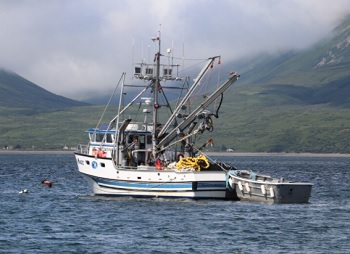
While Chignik fishermen wait on 2018 relief funds, some look beyond the fishery to survive
Aloys Kopun sat in the small harbormaster’s office in Chignik Bay last July as a few boats gently bobbed in the harbor’s turquoise water. “When we were fishing like we normally fished here, the whole harbor was always plump full,” he said. “As you can see, now, we had hardly nobody in here. And everybody’s gone tendering or went to other areas to fish, or some of them went broke.” Kopun fished in Chignik, on the Alaska Peninsula, for decades before becoming the summer harbormaster. Significantly fewer boats have returned since the Chignik sockeye run failed in 2018. Fishermen who depend on the salmon closed out that season without making a paycheck. photos, >click to read< 12:02
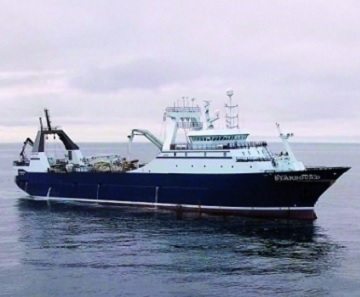
Trident Seafoods purchases 300-foot at-sea processor
Trident Seafoods has reached agreement with Aleutian Spray Fisheries Inc. to acquire the 300-foot at-sea processor C/P Starbound for use in its wild Alaska Pollock and Pacific whiting fisheries,,, The C/P Starbound, built in 1989 as a 240-foot factory trawler for use in the Bering Sea, underwent a $45 million renovation in 2015 that involved slicing the vessel down the middle and welding in a 60-foot addition. This expansion added state-of-the-art processing capacity, enabling full utilization of every sustainably caught wild Alaska Pollock harvested, >click to read< 11:56
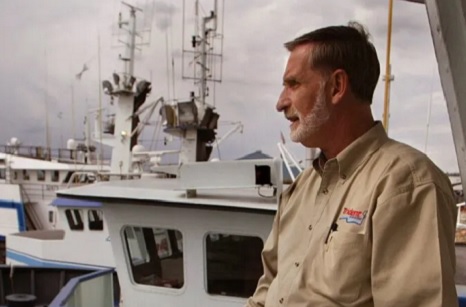
Trident Seafoods’ Chuck Bundrant, a pioneer of U.S. fisheries off Alaska, dies at 79
Chuck Bundrant, an epic figure in North Pacific fisheries who started his career as a deck hand on a crabber and went on to cofound Seattle-based Trident Seafoods, died Sunday at his Edmonds home. He was 79. Bundrant was a fierce competitor who played a pivotal role in ushering in a new era in harvests off Alaska as foreign fleets were pushed out of the 200-mile zone and Americans rushed in to catch pollock, crab, black cod and other seafood. And as U.S. fleets gained control, he fought to ensure that Trident’s network of shoreside processing plants and seagoing vessels would prosper. >click to read< 08:02
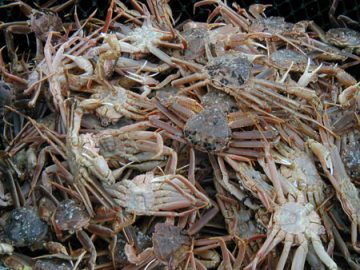
Valuable crab populations are in a ‘very scary’ decline in warming Bering Sea
The forecast for the 2022 winter snow crab season is bleak. At best, it is expected to be considerably less than 12 million pounds. That would be down from a 2021 harvest of 45 million pounds,,, The iconic Bering Sea red king crab, which can grow up to 24 pounds with a leg-span up to 5 feet, also are in trouble. In a big blow to the commercial crabbers, many of whom are based in Washington, the October harvest for these crab has been canceled, something that has only happened three times before. Overall conservation measures are expected to wipe out most of the value of the annual Bering Sea crab harvest, worth more than $160 million during the past year, according to Jamie Goen, executive director of the Seattle-based Alaska Bering Sea Crabbers. >click to read< 13:54
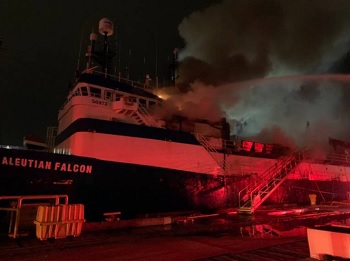
UPDATED: Firefighters battle huge ship fire at Port of Tacoma’s Pier 12
Tacoma firefighters battled a large ship fire in the Port of Tacoma into the early morning. The vessel on fire is the 356-foot Alaskan fish processor Aleutian Falcon, moored at Trident Seafoods on Pier 12. Engine companies on the scene were reporting two large plumes of black smoke from the ship and towering flames amidships. At midnight, the ship was reported listing heavily. >click to read< 07:32. Crews on three fire boats battled a stubborn fire for hours overnight on a moored commercial fishing boat at the Port of Tacoma, more video, >click to read< 11:05

Coronavirus outbreak at Trident Seafoods Akutan plant grows to 135
A seafood plant in Akutan, Alaska, run by Trident Seafoods is facing a large COVID-19 outbreak with 135 of 307 tested employees testing positive for COVID-19, health care officials said on Tuesday morning. The Akutan plant has around 700 employees, and COVID-19 testing is still underway. Dr. Joe McLaughlin, an epidemiologist with the state, said the first report of COVID-19 at the facility was made on Jan. 17. >click to read< 09:19
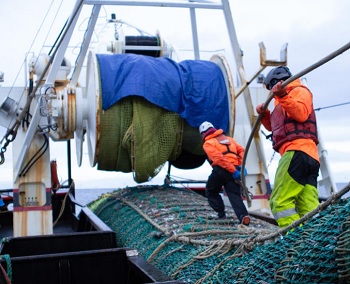
‘Everybody’s worst nightmare’: Bering Sea fishermen on edge after Coronavirus closes second processing plant
Now, fishermen and industry leaders are anxious that they might not have places to offload their catch, and that their plants might be the next to close down, said Dan Martin, who manages a fleet of nine pollock trawlers for a company called Evening Star Fisheries. “Any hiccups like this, you really have to reshuffle the deck and try to figure out, ‘Okay, what’s the next step?’” said Martin, a retired skipper. He called the shutdowns “everybody’s worst nightmare.” >click to read< 10:32

Trident Seafoods to close Alaska plant for three weeks after COVID-19 outbreak
Seattle based Trident Seafoods is shutting down its largest Alaska seafood plant for three weeks after a COVID-19 outbreak, a difficult decision that points to a renewed assault by the coronavirus on the ranks of workers in a key part of the nation’s food-processing industry. Trident is suspending operation at its Akutan facility just at the start of major winter harvests for pollock, North America’s biggest single-species seafood harvest, as well as cod and crab. At Akutan, some 700 employees have stopped working amid a new round of testing, and a fleet of boats that would normally be delivering their catch is now tied to docks. >click to read< 16:39

Coronavirus cases detected at Alaska seafood plant
Seattle-based Trident Seafoods reports that four workers at the company’s Akutan, Alaska, seafood plant have tested positive for coronavirus, including one who had difficulty breathing and had to be evacuated by air to a hospital in Anchorage. The Akutan plant in the Aleutian Islands is a processing hub for Bering Sea harvests of pollock, crab and cod, with a workforce of 700 employees that will swell in the weeks ahead to 1,400 people. >click to read< 07:29
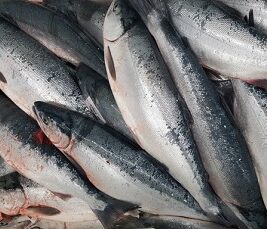
To the editor: Thank you, fish processors
The 2020 commercial fishing season will go down in the history books. In March and April, the prospect of executing statewide fisheries was in question amidst the COVID-19 pandemic and even communities that rely upon fisheries as their economic drivers were pressing for partial or complete closures. Cordova and the opening of the Copper River District were in the spotlight as the first Alaskan salmon fishery to come on line for the summer salmon season. by Dennis Zadra >click to read< 19:44

Bristol Bay salmon processors are starting to post base prices. They are extremely disappointing.
Fishermen have confirmed that Trident Seafoods, Red Salmon / North Pacific Seafoods, OBI Seafoods, and Peter Pan Seafoods have posted a base price of $0.70 per pound for sockeye. That’s just over half of last year’s base price of $1.35. “Well it’s — it’s ridiculous, because it’s not worth it at all. Because I’m putting all this money in,” says Alex, a captain from Wasilla who fishes for Peter Pan Seafoods. He declined to give his last name. Alex says that coming out of a tough season, he’s extremely disappointed with the prices. >click to read< 10:21






